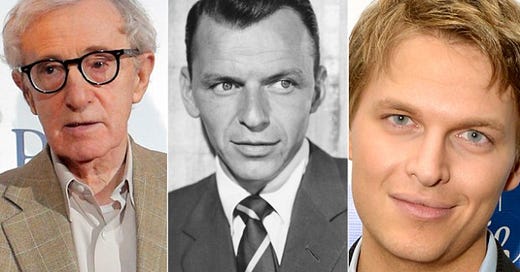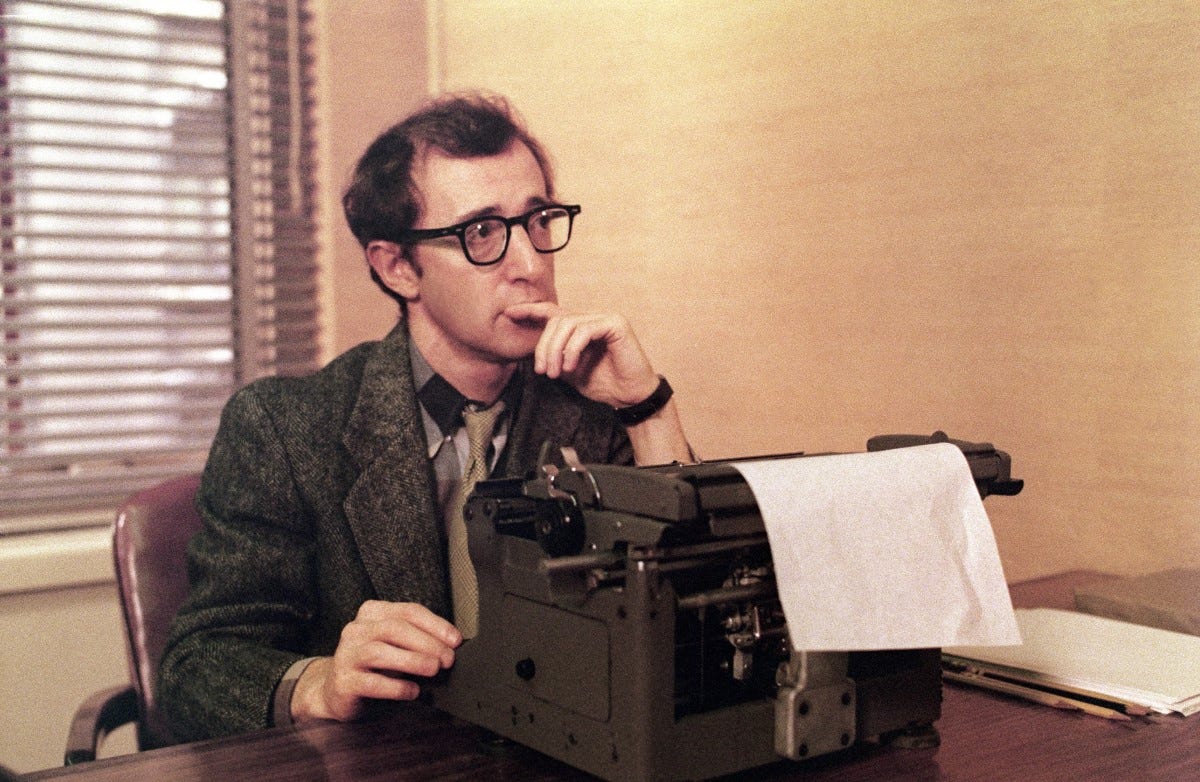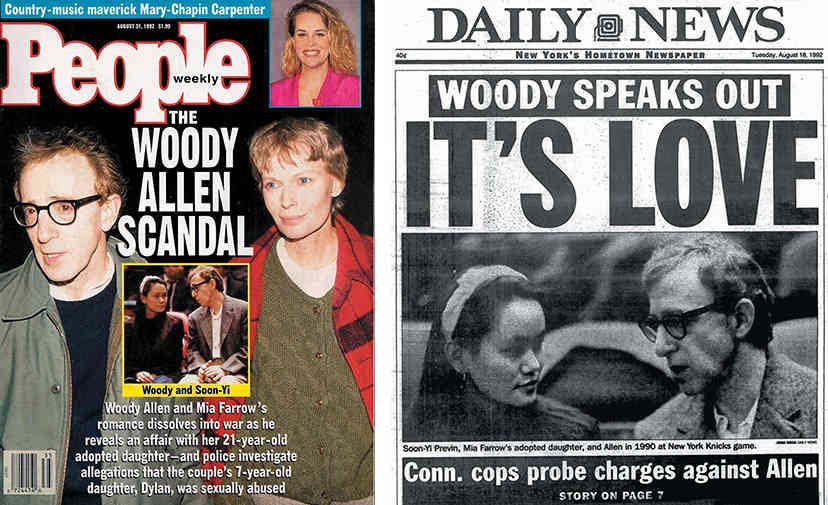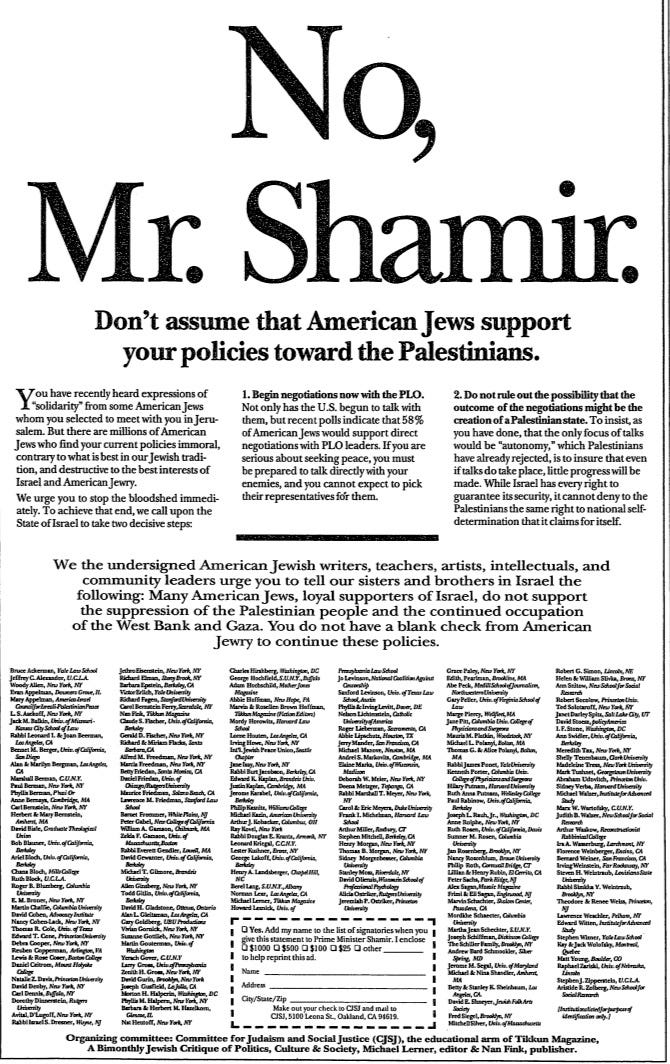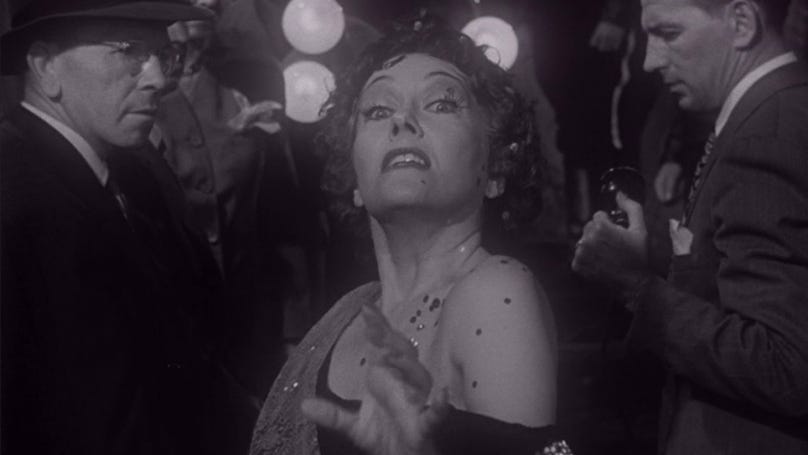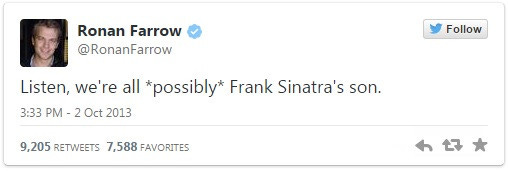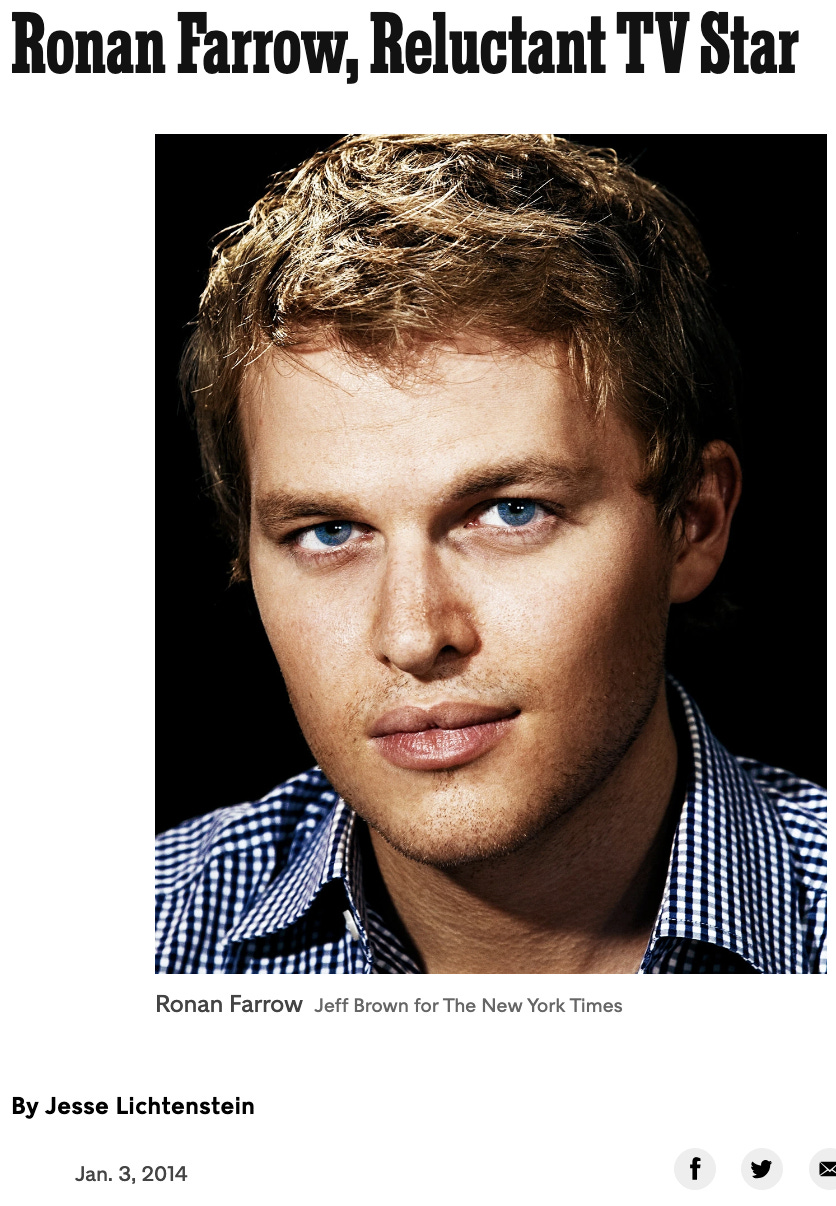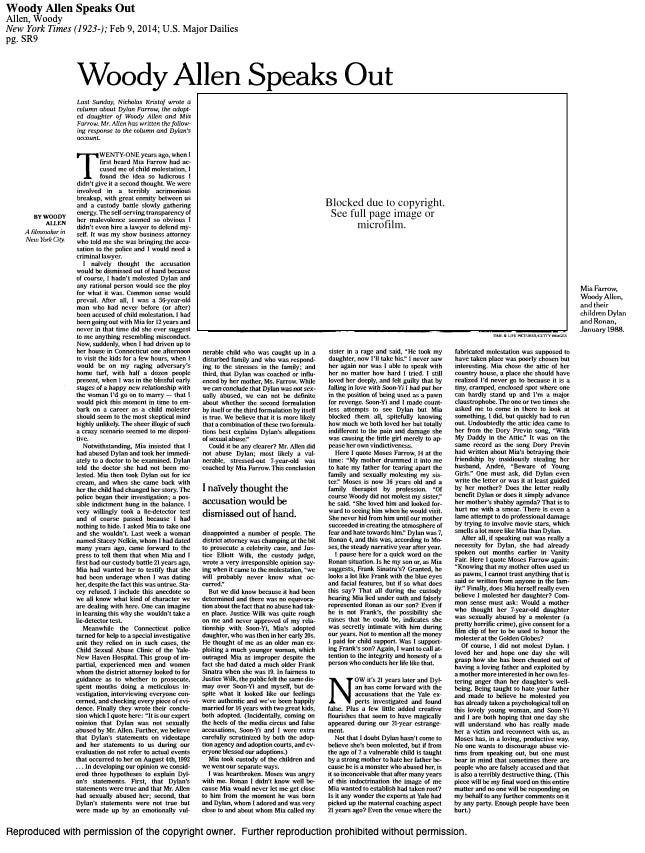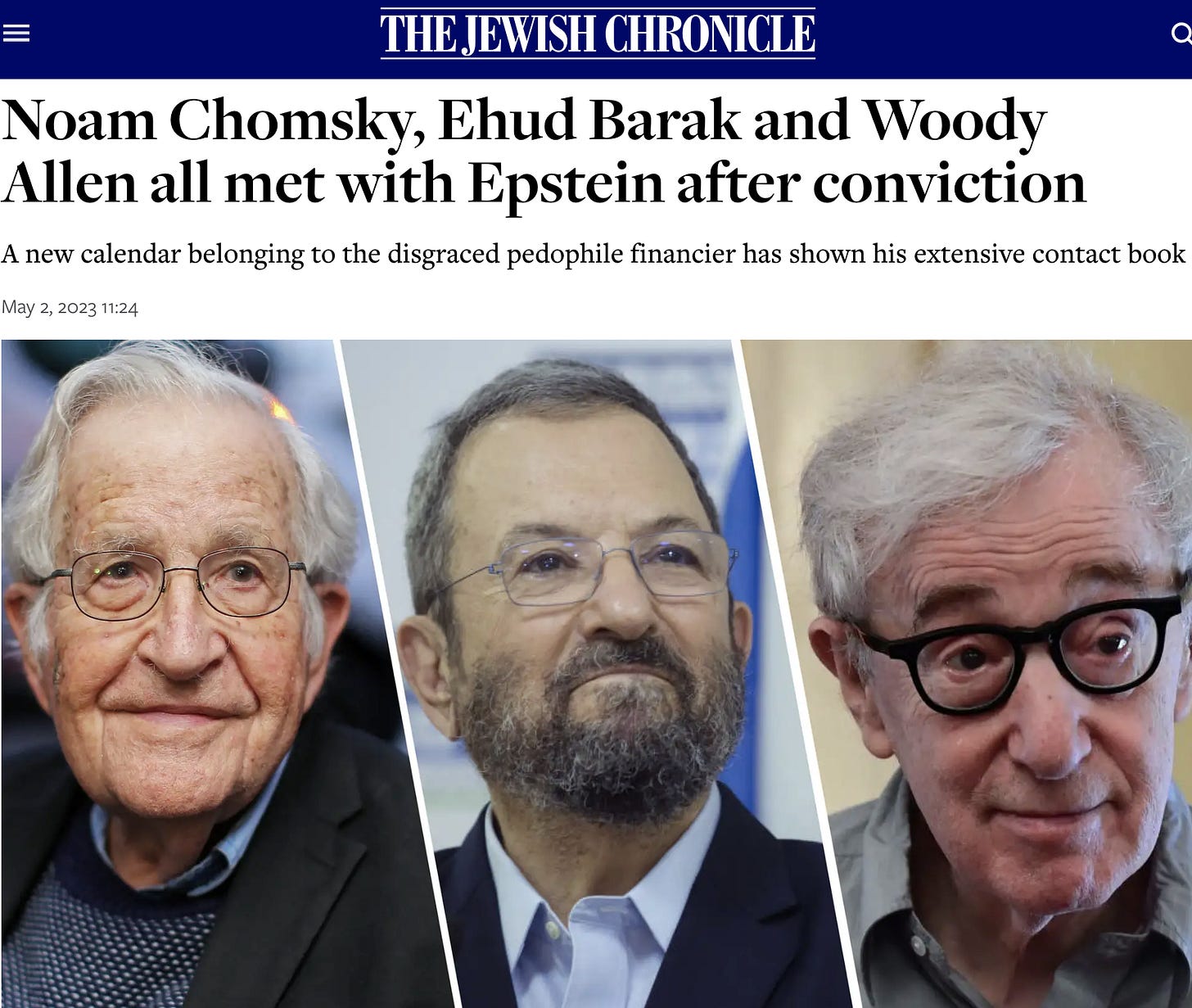Et Tu, Woody Allen? The Media's Murky #MeToo Moments, Zionist Mafia Wars and the ScapeGOAT
With Woody Allen running loose, they needed the colossal sacrifice of Harvey Weinstein to catch him
''Are these the people whose money I used to steal from those little blue-and-white cans after collecting funds for a Jewish homeland?''
First They Came for the Anti-Zionist Jews
Few figures in Hollywood have loomed as large as the 5’5”
, a filmmaker whose work resonates deeply with some while eliciting aversion from many younger audiences who only know of his alleged predation. Since the allegations of abuse first surfaced in 1992, their timely reintroduction to pop culture hints at a narrative far more complex than mere justice catching up with the times. Instead, it points to a carefully orchestrated campaign—interwoven with personal vendettas, the weight of the #MeToo movement, and shifting geopolitical power centers.Allen's tumultuous path serves as a compelling case study in how powerful media narratives, intelligence networks, and elite power brokers shape public perception. His outspoken criticisms of Israel in the late 1980s cast him as a contentious figure well before the allegations of child abuse manifested.
In an era marked by the #MeToo movement's rapid expansion, Allen found himself unfairly juxtaposed with Harvey Weinstein, despite the stark differences in their circumstances. The resurgence of accusations against Allen in 2014—coinciding with Ronan Farrow’s ascendance in journalism—invites us to interrogate how public opinion is crafted and who benefits from these carefully orchestrated takedowns.
While it is an antisemitic cliché to claim that Jewish people run the media and Hollywood, it is undeniable that one’s stance on Palestine can make or break your career in those industries—depending on who’s in power.
The media plays an integral role in shaping the public’s understanding of crime, yet larger conspiracies are rarely understood in real time. While the public’s understanding of sexual violence has vastly improved due to the #MeToo movement, in 2017, I was in a PhD program studying domestic and sexual violence, and it was clear the narrative was not being shaped by those with subject matter expertise.
By unpacking this history, we can transcend the clickbait and see how crime and punishment are executed at the ‘street level’ versus within elite circles. There are far more stick-up artists in prison than stand-ups in prison—for good reason.
Big checks & balances really change things.
Damn Mainstream Media!
Now, as we navigate the turbulent landscape of mainstream media, I find my outlook on America's future to be more optimistic than that of many on the left. Few have recognized that both President Biden and former President Trump have denounced the so-called "lying" mainstream media in the run-up to the 2024 election, which has long operated as an unofficial fourth branch of government.
Having come of age during the highly censored media landscape of the 2000s under George W. Bush—when widespread apathy surrounded U.S. military interventions in Afghanistan and Iraq—the current disintegration of mainstream media feels less like a crisis and more like an overdue reckoning.
The collapse of the political parties perhaps had to come before the implosion of the media mafia, which is glorious to witness. The next step is to outlaw our elected representatives being bought by PAC or corporate money, and to require AIPAC to register as a foreign agent, but for now we can note the sheer lengths the power structure goes to censor criticism of Israel.
Last week, Jewish Voice For Peace staged a protest inside Trump Tower in NYC, and during the NYPD press conference, the representative wouldn’t even say the group’s name.
Demonstrators from the Jewish Voice for Peace group filled the lobby of Trump Tower on Thursday to denounce the immigration arrest of Mahmoud Khalil, a pro-Palestinian activist who helped lead protests against Israel at Columbia University.—Haaretz, March 14, 2025
Post-World War II: It's a Mad, Mad, Mad, Mob World
In our post-World War II hellscape, power dynamics in many spheres—be it media, politics, or crime—are heavily influenced by intergenerational mafia families. These family networks often prioritize long-standing relationships over meritocracy, as illuminated in McMafia, which explores the collaboration between mafia organizations worldwide to amass wealth that rivals many sovereign nations.
According to the United Nations Office on Drugs and Crime, an estimated 2-5% of the global GDP ($800 billion to $2 trillion) is laundered annually. This vast network is not dominated by one group, as criminals must work with the local population wherever you go. Additionally, the standard procedure for intelligence agencies is to collaborate with homegrown criminals to make inroads within countries of interest.
Today, we find ourselves not in the promised final battle of communism vs. capitalism, but the oligarchy vs. the people. If you are lowborn, then to make it in this reality, you must find the right patron. This is why nepo babies thrive—because favors may be passed down with no estate taxes.
This is why the free speech, antitrust, labor, and consumer rights movements are critical to our children’s future. Mainstream media would rather sell you terrifying narratives of a chaotic world than to depict the common people’s struggle to fulfill the promise of freedom in the USA.
We are actively looking backward to try to understand our present and anticipate the future while filtering the bombardment of red herring facts and falsehoods assaulting our senses.
How much of journalists protecting sources is in fact about not exposing networks?
Momma Mia’s Ties to the Italian-Zionist-Russian Mafia!
Ronan Farrow [born Satchel Farrow], known for his central role in the #MeToo movement has often faced speculation that Frank Sinatra is his bio-dad and not Woody Allen. Mia Farrow, who was married to Sinatra from 1966 to 1968, maintained a close relationship with him until his death in 1998.
“[Ronan Farrow] is a big part of us, and we are blessed to have him in our lives.”
—Vanity Fair, October 2, 2013
The Italian-Zionist-Russian Mafia is a hop and skip from many of the most consequential events in the 20th century: from ending World War II with Operation Underworld to the collapse of the Soviet Union (as was in the USA, Gorbachev’s anti-alcohol policies expedited the exponential growth of organized crime). So too, Frank Sinatra entertained the gangsters the whole time.
Sinatra and the Genovese Family
While Mia was a Hollywood nepo baby, Sinatra found his patron in Willie Moretti, an underboss of the Genovese crime family. In the late 1980s, the Gambinos and "the Teflon Don” took many of the headlines as the Five Families’ stranglehold over NYC organized crime loosened. Yet, it was the Genovese crime family that was the true power center of the American mafia. They organized mafia families across the country into The National Crime Syndicate, which oversaw the federation of organized crime in the USA.
The Godfather of the Genovese family, Lucky Luciano, was a close criminal associate of Meyer Lansky since they were children. Known as “the Mob’s Accountant,” Lansky laid the foundation of transnational organized crime:
Immigrating with his family from Imperial Russia in 1911, Lansky’s work spanned the pre-Prohibition days of the New York City rackets, where he had an early partnership with Benjamin “Bugsy” Siegel, to the consolidation of the New York Mob under Charlie “Lucky” Luciano, and on to the development of Las Vegas and Havana, Cuba, as “open cities” for the Mob. He controlled casinos in the Bahamas and in London, as well as, reportedly, a Swiss-based bank through which he laundered profits.
Lansky’s background as a Russian Jewish immigrant meant that from the very beginning of the Italian mafia’s ascent, Jewish mobsters were integral to their rise. He contributed tons of money to support the Zionist project—profits derived from skimming casinos and the drug trade. Ultimately, attempting to flee prosecution by the USA government, he sought to immigrate to Israel, but due to pressure, he was denied his “Right To Return” (i.e. automatic Israeli citizenship for Jewish people across the world).
Sinatra Aiding the Haganah
Frank Sinatra was an enlistee into the Zionist project and was a vocal public supporter and fundraiser for the creation of Israel. Ironically, celebrities are excellent spies because they’re so well-known they can gain access to spaces that others’ cannot.
In mid-century America, Sinatra would frequently perform at the mafia-run Copacabana Club, “the hottest place north of Havana.”
Near the Copacabana was the headquarters of the Haganah mission, which was under almost continuous surveillance by Federal agents. (The Haganah who would later become the ideological base of the IDF.) During this era, the future Mayor of Jerusalem, Teddy Kollek, recounted an incident in his memoir where Sinatra acted as a money currier to facilitate arms trafficking to occupied Palestine.
Sinatra was performing at the Copacabana Club, which was essentially run by mafia figures with whom he’d become involved. The club, under almost continuous surveillance by Federal agents, happened to be next door to the hotel out of which Haganah members were operating. Here is how Kollek [future mayor of Jerusalem] tells the story in his autobiography:
I had an Irish ship captain sitting in the port of New York with a ship full of munitions destined for Israel. He had phony bills of lading and was to take the shipment outside the three-mile limit and transfer it on to another ship. But a large sum of money had to be handed over, and I didn’t know how to get it to him. If I walked out the door carrying the cash, the Feds would intercept me and wind up confiscating the munitions.
I went downstairs to the bar and Sinatra came over, and we were talking. I don’t know what came over me, but I told him what I was doing in the United States and what my dilemma was.
And in the early hours of the following morning I walked out the front door of the building with a satchel, and the Feds followed me. Out the back door went Frank Sinatra, carrying a paper bag filled with cash [estimated at $1 million]. He went down to the pier, handed it over, and watched the ship sail.
—The Jewish Press, May 10, 2017
As we move through this article, keep this context in my mind: Arguably the case against Woody is a byproduct of 50 years of unprecedented consolidation of power in Hollywood, the media, and organized crime. Woody’s ultimate public ruin was not merely a result of a woman scorned in 1992, but of a coordinated, yet often unacknowledged mafia network born in the shadows of World War II.
1992: The Headlining Break-up of Woody & Mia
Through abductive reasoning, I have concluded that Woody Allen’s relationship with Mia Farrow involved some form of ongoing connection to the mafia, which may have ensured his films were funded as long as he cast Mia Farrow. After making a movie almost every year since 1967, perhaps the aging actress (by Hollywood standards) needed payola to keep getting cast?
You’ll have to wait for the “follow the money” explanation—for now, let’s stick to the plotlines and timeline.
On August 17, 1992, Woody went public with his relationship with Soon-Yi, the same day the Connecticut State Police announced an investigation into allegations that Woody had sexually assaulted his youngest child, Dylan. Woody claimed Mia’s lawyer, Alan Dershowitz (who would later represent Jeffrey Epstein), approached him earlier that day with a proposal for a $5-7 million confidential settlement. Woody chose against succumbing to blackmail and decided to go public.
Woody and Mia’s relationship began in 1980, and they would go on to make 13 films together culminating in Husbands and Wives, released on September 18, 1992, almost a month after the scandal broke. Mia had learned of Woody’s relationship with her 21 year-old adopted daughter Soon-Yi earlier that year, but believed the affair was over as they continued shooting the movie. The film’s plot involves two married couples, with Woody and Mia playing a couple in which he has a flirtation with a college student.
You can watch the four-part HBO docuseries Allen v. Farrow is today’s widely accepted version of events as told by the Farrows. The filmmakers had access to abundant phone recordings Mia had made of her and Woody’s conversations during this time period and to a young Dylan’s videotaped description of the abuse. Mia describes her experience during the custody battle as being followed and spied on—similar to what Ronan would later experience while reporting on Weinstein.
There are various accounts of Sinatra’s response to Woody’s alleged abuse, many involving threats of violence, from offering to break Woody’s legs to requesting a mob hit.
Here is a 60 Minutes interview with Woody in 1992:
Woody’s voluminous body of work integrates his own life experiences, and a fun exercise is to parse out which films allude to relationship with Mia. Broadway Danny Rose (1984), debuting in the early years of Woody and Mia’s relationship, revolves around a talent agent who represents a singer having an affair with a young woman whose ex-lover is in the mafia.
Bullets Over Broadway (1994) was Woody’s first film following the scandal, and its plot is particularly telling:
Struggling 1920s playwright David Shayne, having failed to secure financing for his latest work, reluctantly makes a deal with mob boss Nick Valenti: a Broadway debut with the chance to direct, as long as Nick's flibbertigibbet girlfriend, Olive, plays one of the lead roles. As Olive and star Helen Sinclair attempt to upstage each other, Olive's gangland bodyguard Cheech starts suggesting changes to David's script.
Was the Media Weaponized Against Woody Allen, the Self-Hating Jew?

Even those who will not condemn Israel's policies--because of cognitive dissonance, perhaps, so great is the gulf between myth and reality--still call for an end to the brutality, for Israel's own sake. Woody Allen, for example, who has never before publicly aired his views on political issues, has called in the New York Times for Israel's friends to "speak out and use every method of pressure--moral, financial and political--to bring [Israel's] wrongheaded approach to a halt."
—Anne Joyce, American - Arab Affairs, December 31, 1987
The First Cancellation of Woody Bombed
Woody Allen went public with his views on Israel after their brutal response to the Palestinian’s First Intifada that began in December 1987. A month later, he wrote a controversial op-ed, “Am I Reading the Papers Correctly” in the New York Times, where he expressed he was "appalled beyond measure by the treatment of the rioting Palestinians by the Jews."
By April 1989, Woody became a leader of the Committee for Judaism and Social Justice, a group created to combat the American Israel Public Affairs Committee’s (AIPAC) influence in the United States. Woody would find some of his loudest critics to be Zionist Jews—and they never forget.
Elie Wiesel, author of Night where he documented surviving the Holocaust, published an op-ed criticizing Jewish intellectuals who spoke out against Israel. Many people believe it was safe to assume Wiesel was referring to outspoken Jews like Woody.
Many critics [of Israel] were outdone by some Jewish intellectuals who had never done anything for Israel but now shamelessly use their Jewishness to justify their attacks on Israel.
—New York Times, June 23, 1988
In turn, many assumed Woody was responding to Wiesel’s criticism by publishing an essay in the January 1990 issue of Tikkun. Woody, sitting in a fancy restaurant, observed a 60-something Holocaust survivor showing his companions the number tattooed on his arm. Woody wondered: if an angel had appeared to the man when he was a prisoner, starving in the camp, and told him one day he would be fine dining with beautiful women in designer clothes, would the man have choked the angel in a bout of insanity?
Shortly before the Allen v. Farrow scandal broke, an article “The Secret Section in Israel's U.S. Lobby That Stifles American Debate” reported that AIPAC had opened an investigation into Woody Allen, as part of their opposition research department into enemies of Israel.
To date, revelations about AIPAC's blacklisting and smear tactics have barely scratched the surface of the pro-Israel lobby's secret activities. Former Congressman Paul Findley, in his 1985 best-selling book They Dare to Speak Out: People and Institutions Confront Israel's Lobby, documented what he could see of that lobby's impact on U.S. politics, defense, foreign and economic policies, as well as academia and the media. However, as an insider who worked within AIPAC's stealth section, I can confirm what Findley could only surmise. That an organized blacklisting operation exists is a tragic fact that no longer should be ignored.
AIPAC's "opposition research" department traces its roots to I.L. (Sy) Kenen, who founded AIPAC in 1954. As editor of AIPAC's weekly Near East Report, he often attacked critics of Israel in his aptly titled column, "The Monitor." Besides monitoring, analyzing, and responding to "anti-Israel" comment and activities in the United States, Kenen also kept files on AIPAC's "enemies." In his final year AIPAC began to expand its intelligence-gathering operations.
…
Reminiscent of Senator Joe McCarthy's scouring of Hollywood for "communists," and their "fellow travelers" in the entertainment industry, AIPAC also has opened files on Ed Asner, Woody Allen, Richard Dreyfus, Vanessa Redgrave, Casey Kasem, Mike Farrell, Barbra Streisand, Michael Moore, Peter Yarrow, and many more.
—Gregory Slabodkin, The Washington Report on Middle East Affairs, July 31, 1992
Woody’s criticism of Israel would continue to be news as the decades wore on, such as the August 2014 article in the Washington Examiner: “10 celebrities who have opinions on the Israel-Palestine conflict that no one asked for.”
2014: Ronan Farrow Career Launch. Take One.
The entire rollout of Ronan Farrow’s career as a high-profile journalist coincided with Woody being honored with the Cecil B. Demille Lifetime Achievement Award at the 2014 Golden Globes. His persona as a journalist was always bound up with his nebulous family of origin.
While few knew of Ronan Farrow, he had co-wrote a Wall Street Journal op-ed with Mia in 2007 for calling out “Steven Spielberg’s role as an artistic adviser of the Beijing games, comparing it to Nazi propagandist Leni Riefenstahl’s role in the 1936 Berlin Olympics.” Thus, the Farrows’ betrayed a willingness to weaponize antisemitism against high-profile Jews who are empathetic to the Palestinian cause.
On September 13, 2013 it was announced that Woody is being honored with the Lifetime Achievement Award. The following month, it was announced that Ronan was in talks to host his own MSNBC TV show, Ronan Farrow Daily. The media train started chugging away as the Farrows scored a huge profile in Vanity Fair, where Mia first acknowledged Ronan’s possible true parentage and Dylan went on the record for the first time about her allegations against Woody. In the article, while Mia shouts out her 14 children, when she discusses her humanitarian work she refers to Ronan as “her partner in this crusade.” So Freudian.
A gushing profile of Ronan also appeared in the New York Times Style section, where Michael Schulman writes:
Ronan Farrow is a relatively recent invention. He was born Satchel Farrow, named after the Hall of Fame pitcher Satchel Paige. At his birth, Mr. Allen joked, “The only problem is, he looks like Edward G. Robinson.”
Woody Allen was not in attendance at the Golden Globes, and his longtime loyal friend, Diane Keaton, accepted the award in his stead. This prompted the Farrows to tweet about Woody described by NPR in the headline, “Abuse Allegations Revive Woody Allen’s Trial By Media.”
This development gave the Farrows narrative momentum, and Dylan Farrow began looking for a venue to publish an op-ed about Woody, which eventually appeared on New York Times columnist Nicholas Kristof’s blog, after both the New York Times and LA Times declined.
The New York Times (likely confident in his innocence) gave Woody an entire page to rebut the revived allegations against him.
By the end of the month, Ronan Farrow Daily launched on MSNBC, and Ronan expediently became an award winning journalist.
“His first television show has only been on the air for three days, but Ronan Farrow is already winning awards for his journalistic work. Reach the World, a global education group, will honor the 26-year-old Farrow with its annual Cronkite Award for Excellence in Exploration and Journalism.”
—National Review, February 26, 2014
The show would be summarily canceled after a year. However, Ronan went on to become #MeToo’s golden boy. The initial failure to launch a high-profile journalistic career was tough. Dylan’s bravery telling her story inspired him to continue pursuing hard-hitting journalism.
One wonders—what kept him from acting?
How Coordinated Was #MeToo, Ronan?
Ronan would find his rocket to stardom after his first article on Harvey Weinstein for the New Yorker, where Woody also has many famous articles. The New York Times beat him to the Weinstein story by a matter of days, though he would go on to share the Pulitzer Prize with those journalists, Jodi Kantor and Meghan Twohey.
Soon after the Weinstein story broke, Larry David, hosted SNL and during his opening monologue he mentions noticing many of the #MeToo accusations were directed against Jewish men in Hollywood. He expressed his desire to be a good representative of Judaism, paying homage to Woody’s old musings about Elie Wiesel by telling this this joke:
I have always been obsessed with women. And I have often wondered, if I had grown up in Poland when Hitler came to power and was sent to a concentration camp would I be checking out women in the camp? …I think I would…
Ronan’s persona as a prodigious mind handily peels away under closer scrutiny from other journalists—with evidence standards that hold up in court. By 2020, Ben Smith of the New York Times was asking: “Is Ronan Farrow Too Good To Be True?”
Because if you scratch at Mr. Farrow’s reporting in The New Yorker and in his 2019 best seller, “Catch and Kill: Lies, Spies, and a Conspiracy to Protect Predators,” you start to see some shakiness at its foundation. He delivers narratives that are irresistibly cinematic — with unmistakable heroes and villains — and often omits the complicating facts and inconvenient details that may make them less dramatic. At times, he does not always follow the typical journalistic imperatives of corroboration and rigorous disclosure, or he suggests conspiracies that are tantalizing but he cannot prove.
At the launch of his fame, Ronan was painted as a reluctant celebrity, although, curiously, he has given far more interviews than he has ever conducted.
On the podcast Inside The Hive, two years after #MeToo launched, the host asks Ronan why so many of the cases are people in the media. Not to say these are necessarily innocent people, but perhaps there were ulterior motives or a pattern of who was chosen to go down first.
Bundled with Weinstein, Woody Is Canceled
It would take some time, but soon after Weinstein went down, so too would Woody. In his case, there had still only been the one accusation of sexual misconduct over the decades. Perhaps Ronan bundling the news with the personal and political allowed him to fulfill his mother’s long-term goal and the AIPAC lobby’s ambition for Woody to be renounced by Hollywood.
Woody had a professional relationship with Weinstein, whose company Miramax began distributing his films starting with 1994’s Bullets Over Broadway. Soon after Ronan’s first Weinstein piece, Woody was on the defensive—already needing to clarify his first public statement that appeared sympathetic to Weinstein while warning of a potential witch hunt.
By March 2018, there were listicles of all the celebrities who had disavowed working with Woody. Soon-Yi gave her first-ever interview to New York Magazine in a climate that Daphne Merkin, Woody’s longtime friend, described thusly:
In any event, it’s Mia et al.’s account of events that has so far carried the day. Actors such as Greta Gerwig, Colin Firth, and Mira Sorvino have recently apologized for accepting roles in Allen’s films, while many of his most avid fans have turned against him, everyone from New York Times movie critic A. O. Scott to my media-alert periodontist, who told me on my last visit that he’d never watch another Woody Allen film.
Woody Allen responded himself at the time, saying:
“I mean this is just so crazy. This is something that has been thoroughly looked at 25 years ago by all the authorities and everybody came to the conclusion that it was untrue. And that was the end and I’ve gone on with my life. For it to come back now, it’s a terrible thing to accuse a person of. I’m a man with a family and my own children. So of course it’s upsetting.”
Something Funny Is Going On
Thus, there is a whole generation that has not heard one Woody witticism and has a preprogrammed aversion to watching any of his movies. But were the conservatives right that cancel culture and #MeToo were killing free speech? Further too… at least as far as I can tell… the relatively benign (vs. Weinstein) offenses of comedians Louis C.K. and Aziz Ansari were perhaps targeted because of their pro-Palestinian stance.
Moreover, was the continuous failure to cancel Dave Chappelle for his trans jokes just a proxy for his criticism of Israel?
The Fog of Sex Crimes
Alleged sex crimes aside, is it possible that there was a group of high-profile Jews in the diaspora that worked together to try to stave off a group whose ultimate objective was genocide, which we are seeing in Palestine today? It certainly poses a moral question to wonder if the use of blackmail—sexual or otherwise—is warranted if it keeps people’s genocidal tendencies in check.
It is antisemitic to say the Jews control the media, but it seems readily apparent that the Zionist mafia weaponizes the media and antisemitism to advance their agenda. Something pivotal changed in the wake of #MeToo. Jeffrey Epstein’s blackmail and sex trafficking ring ended with his murder while in federal custody with Bill Barr’s DOJ. It is likely that whoever got control of Epstein’s purported kompromat had much more sinister motives than his contingent.
People are conditioned to see Weinstein as absolutely succumbed to evil, but his history shows that he is anti-genocide. It broke in November 2017 that Weinstein was referred to Black Cube, his Mossad-trained private investigators, by former Israeli Prime Minister Ehud Barak—a Netanyahu critic and advocate for a two-state solution for Palestine and Israel. In the media, Barak is often painted as a close associate of Epstein.
The game with the highest stakes doesn’t take kindly to transparency. We may never know what “side” people are really on, whether they were useful idiots or burnable assets, and beyond. Although on the grandest scale, we are seeing death in hotspots around the world, and we know money and arms are exchanging hands.
Chomsky said Epstein arranged the meeting with Barak to discuss “Israel’s policies with regard to Palestinian issues and the international arena,” according to the Journal.
— The Jewish Chronicle, May, 2, 2023
For the immediate term, I put any ideas of pacifying the conflict, solving it, on the shelf. Now we have to destroy Hamas’s capabilities and its presence as the ruler of the Gaza Strip. But I never lose sight of the right vision for Israel with two states. Not because of justice for the Palestinian, which is not my utmost priority, but because of our own future and identity and security.
—Ehud Barak, New York Mag Intelligencer, October 26, 2023
Allen v.(is-à-vis) Spears
The New York Times’ ‘Framing Britney’ exploded into the zeitgeist on February 5th, 2021, ushering in the era of reflecting on the media’s depiction of women. With HBO releasing the docuseries Allen v. Farrow two weeks later, the media awkwardly reached for parallels between the two cases.
Ronan would soon be covering Britney’s conservatorship for the New Yorker as well.
For reasons unknown, Britney posted two quotes from Woody Allen on Instagram in 2023, only for them to be quickly deleted.

The fanbase was mixed about the appropriateness of her “platforming Woody,” with even a feminist rag posing the question: Do We Think Britney Spears Knows About Woody Allen?
Do we even have to ask?
I have a different question.
Why was Ehud Barak’s journalist cousin, Daphne Barak, embedded with Britney’s estranged family after the conservatorship ended?
So many people I’m tracking are back in the news! The RDIF’s Kirill Dmitriev was at the Ukrainian peace talks between the USA and Russia held in Saudi Arabia. President Trump recently announced the USA would soon have its own sovereign wealth fund, and he is nominating Benjamin Black, son of Apollo’s Leon Black, to head the project.
I’m excited to see where this is all headed with a (hopefully) cleaned-out cleaned-up and reinvigorated FBI and DOJ. I want to live long enough to know exactly why Epstein, Russiagate, the Caesars bankruptcy, and Britney’s conservatorship are related.
What in the oligarchy is really going on here?

